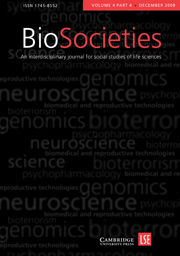In a recent commentary in Nature, Harry Collins (Reference Collins2009) describes the dominant ethos in science studies to be cynicism; the current ‘post-modern’ sensibility has concluded that ‘science is just a form of faith or politics,’ he writes. This is a profoundly mistaken and damaging misrepresentation of current work in the broad field of science studies, especially as it relates to the life sciences. As the articles published in successive issues of BioSocieties demonstrate, over the last decades, sociologists and anthropologists, together with those working in science and technology studies and in certain areas of psychology, have forged deep and lasting alliances with researchers in the life sciences and biomedicine. Together we have explored the social conditions and consequences of the advancing research front, analysed the pathways from ‘bench to bedside’ and back again, and considered the ethical, legal and geopolitical implications of developments from genomics and synthetic biology to neuroscience and organ transplantation. While critical analysis is imperative, the ethos of this work is not scepticism about science and its discoveries. Indeed the reverse is the case. The social science community with which we work is committed to productive engagements with scientists, to integration of social and scientific perspectives and agendas, to the painstaking accumulation of empirical data about the life sciences in the real world, alongside the development of the concepts necessary to analyse the social life of biomedicine. We share a commitment to ensuring that our astonishing progress in understanding the basic mechanisms of vitality really does improve the health, well-being and life chances of human beings. Perhaps the most unfortunate aspect of Collins’ article—and the reason we mention it in this editorial—is its publication in one of the world’s leading scientific magazines. A readership made up largely of scientists and policy-makers could be forgiven for believing that this was an accurate diagnosis. We urge the readers of BioSocieties to join us in correcting this caricature of our work and its aspirations.
The articles published in this issue of BioSocieties once again illustrate the productive potential of intellectual work that takes seriously the social context of scientific research and discovery, as well as the science itself. This potential is indicated in the article by Choudhury, Nagel and Slaby, which outlines a ‘Critical Neuroscience’ research agenda that links social theory to developments in the neurosciences. The authors argue for an empirical approach that embeds a critical sociology within neuroscience research projects in neuropharmacology, neuro-imaging and psychiatry. The term ‘critical’ in this approach is not meant to signal criticism, let alone cynicism; rather it is meant as a call for reflexivity in science, particularly on the part of neuroscientists. And, of course, this call for reflexivity should also include the social scientists working to construct models of ‘Critical Neuroscientific practice’: they too must avoid conjuring imaginary enemies, and will be confronting novel modes of practice and epistemologies that require reflection and re-shaping of their own approaches.
This mutual reflexivity is evident in a set of illuminating interviews conducted by Martyn Pickersgill, whose article could be seen as an empirical example of ‘critical neuroscience’. Pickersgill focuses on a controversial area of neuroscience, research into psychopathology and criminality, and shows the extent to which simplistic sociological criticisms that accuse neuroscience of ‘reductionism’ and ‘determinism’ must be rethought in the face of the complexity being demonstrated by current research and articulated by the researchers themselves. Pickersgill joins other sociologists in identifying ‘risk’ as the arena within which relevant neuro-social theory must be developed—and risk, of course, refers to a field of complex social judgements which cannot be extrapolated from a knowledge of molecular processes alone.
Efforts to evaluate risk—and the public's desire to have risk information—lie at the heart of efforts to commercialize tests for various disorders and conditions. While much attention has focused on genetic risk, other areas of risk have often been neglected, for example the development of tests for food intolerance and allergy. Such tests may well be more palatable to a public that is increasingly conscious about the origin of its food, as well as the impact of that food on all aspects of individual physiology, functioning and well being. In the analysis of this market by Kerr et al., the critical approach does not come from social scientists alone: the legitimacy of food intolerance testing, and the commercialization of the tests themselves, are sharply contested within medicine. The role of public perspectives and understanding, specifically the ways in which the public attributes credibility and expertise to scientific representations and products, is further explored in the article by Morten Andreasen, which analyses a series of Danish focus groups held to investigate public understanding of gene patenting. This theme is also present in a fascinating interview with Yadin Dudai, a prominent neuroscientist, on his recent discoveries in memory research: the discussion similarly touches upon the translation of basic research findings into the marketplace; and the potential for drugs and other interventions that could enhance, or erase, certain dimensions of human memory.
Finally, Javier Lezaun introduces a provocative Books Forum on the global AIDS crisis, in which he and the review authors argue powerfully for the utility of multiple approaches and frameworks for understanding this epidemic; and the promises of productive intersections of the medical and the social sciences for solving one of the most intractable problems facing the global South.


